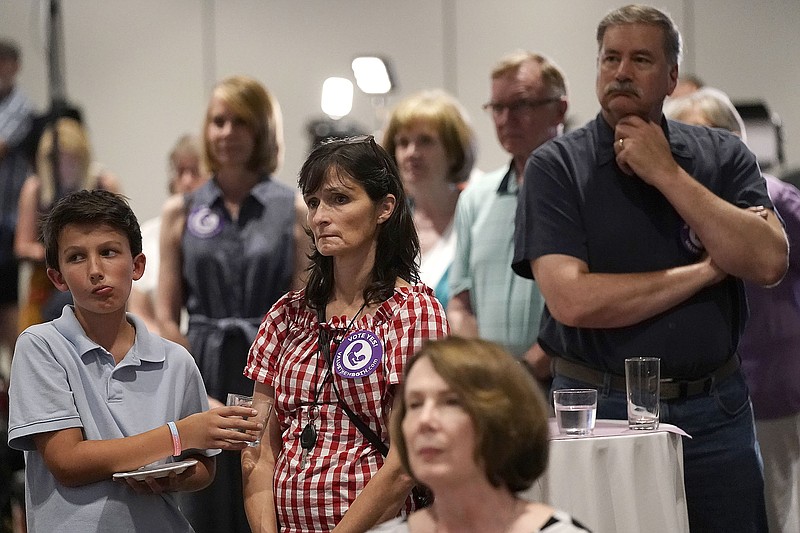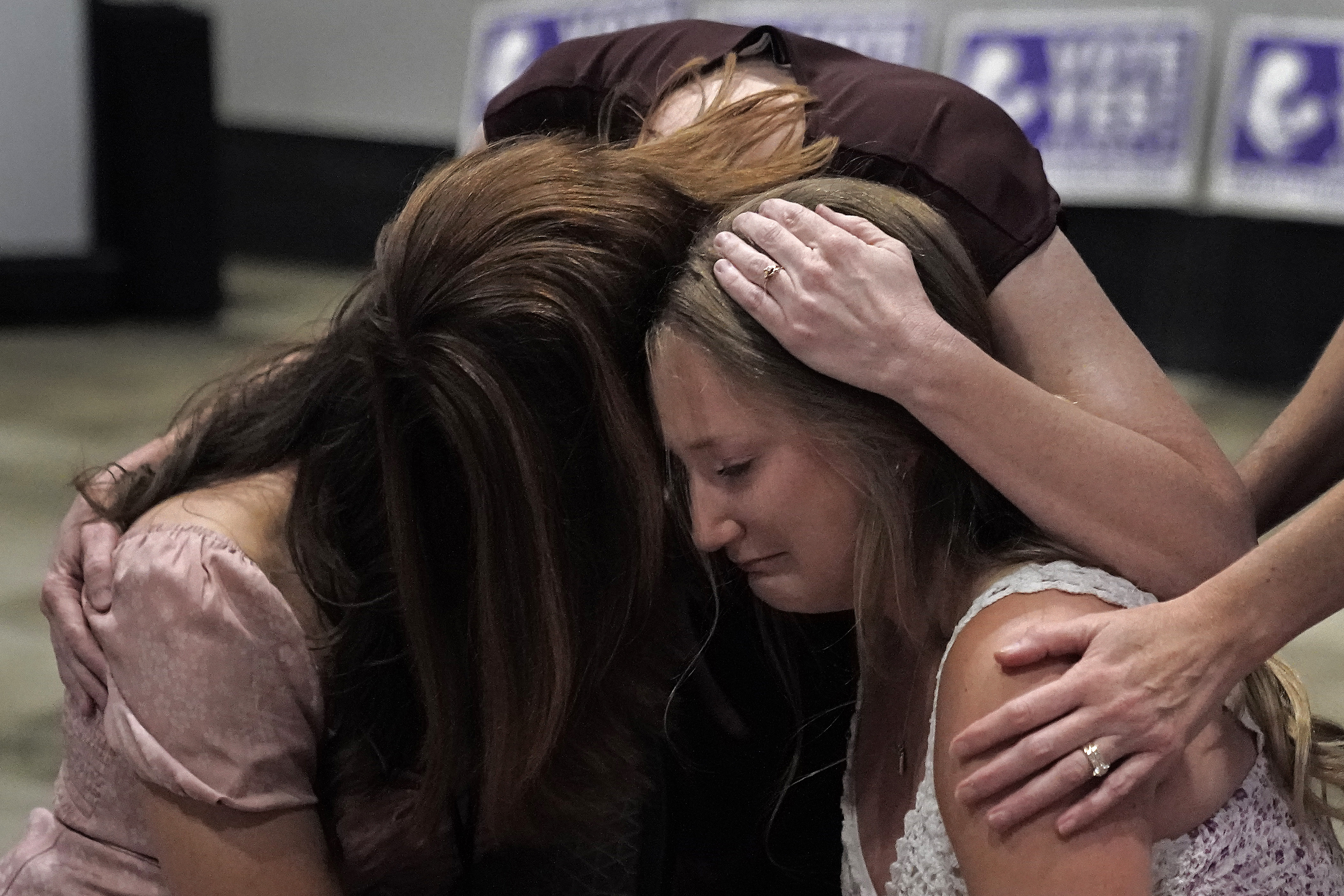NEW YORK -- Democrats displayed a newfound sense of optimism about the election-year political climate Wednesday after voters in traditionally conservative Kansas overwhelmingly backed a measure protecting abortion rights.
At the White House, President Joe Biden hailed the vote in Kansas as the direct result of anger at the Supreme Court's decision in June to repeal a woman's constitutional right to obtain an abortion.
Republicans and the high court "don't have a clue about the power of American women," Biden said. "Last night in Kansas, they found out."
On Capitol Hill, Senate Majority Leader Charles Schumer, D-N.Y., boasted of the political winds "blowing at Democrats."
"Last night in the American heartland, the people of Kansas sent an unmistakable message to the Republican extremists," he said. "If it's going to happen in Kansas, it's going to happen in a whole lot of states."
With three months until the November election, the optimism may be premature. But it represents a much-needed break for a party that has spent the better part of the past year reeling from crisis to crisis, including the botched withdrawal from Afghanistan and rising prices for gasoline and other goods. Those developments have contributed to Biden's low approval ratings, leaving Democrats without a unifying leader in a position to rally voters before the election, with control of Congress at stake.
The Kansas vote, however, suggests that threats to abortion rights may energize Democrats in a way few political leaders can. And it comes at a moment when the party is gaining momentum on other fronts, including a legislative package to reduce prescription drug prices, combat climate change and raise taxes on corporations.
"Kansans bluntly rejected anti-abortion politicians' attempts at creating a reproductive police state," said Kimberly Inez McGuire, executive director of Unite for Reproductive & Gender Equity. "Today's vote was a powerful rebuke and a promise of the mounting resistance."
Alexis McGill Johnson, president of Planned Parenthood Action Fund, said Kansas voters "rejected a dangerous amendment that would have let anti-abortion politicians eliminate access to essential health care."
"They protected their right to decide what is best for their own bodies, lives and futures," she said. "And they made it resoundingly clear that they don't want politicians involved in their medical decisions or abortion bans in their state."
The challenge for Democrats will be to maintain the energy for several more months and defy trends that typically trip up the party in power.
In recent history, the party controlling the White House almost always suffers deep losses in the first midterm election of a new presidency. Also, an overwhelming majority of voters believe the country is headed in the wrong direction amid inflation and other economic concerns.
Even with abortion-related momentum, many Democratic strategists privately expect to lose the House majority and believe the Senate is essentially a coin flip.
The day after the Kansas vote, Democratic strategists on the front lines of key midterm contests described a complicated political reality on abortion.
KANSAS VOTERS GALVANIZED
Abortion rights supporters surged to the polls in Kansas, where abortion was quite literally on the ballot. By a roughly 20 percentage point margin, they rejected a measure that would have changed the state constitution to allow state lawmakers to impose restrictions on abortion -- or even a ban. The early August primary turnout was on par with a governor's general election contest.
But few elections this fall will feature such clear stakes for abortion rights. Just four states -- California, Kentucky, Michigan and Vermont -- are expected to feature a Kansas-style abortion referendum on the November ballot, according to the pro-Democratic group EMILY's List.
"Make no mistake, abortion is on the ballot across the country in November, and voters will be holding Republicans accountable for their efforts to strip us of our rights -- the success of blocking this anti-abortion ballot initiative is proof of that," Laphonza Butler, president of EMILY's List, said in a statement. "Voters will not stand by while Republicans play politics with our bodies and our futures."
In the majority of states, Democrats must convince voters they can protect abortion access only by defeating anti-abortion Republican candidates at the state and federal level. While that is true in most cases, it's much more complicated to run against a candidate than a single-issue ballot measure, according to Democratic pollster Molly Murphy.
"The optimist would say, when voters know that abortion is on the ballot, they are motivated to turn out," Murphy said. "That's the messaging challenge that we are going to face. Will voters believe that a legal right to abortion is at stake here in this country in their vote for Congress, Senate, governor, state house -- all of those things -- and be as motivated to show up to vote?"
"Republicans are going to do everything they can to deflect and not engage on this," she added, noting the GOP's heavy focus on inflation, gas prices and immigration.
As Democrats celebrated on Wednesday, the Republican reaction to the abortion vote was decidedly muted.
The Kansas vote was "a huge disappointment for pro-life Kansans and Americans nationwide," said Mallory Carroll of Susan B. Anthony Pro-Life America.
The electorate in Tuesday's vote wasn't typical for a Kansas primary, particularly because tens of thousands of unaffiliated voters cast ballots.
Kristy Winter, 52, a Kansas City-area teacher and unaffiliated voter, voted against the measure and brought her 16-year-old daughter with her to her polling place.
"I want her to have the same right to do what she feels is necessary, mostly in the case of rape or incest," she said. "I want her to have the same rights my mother has had most of her life."
Opponents of the measure predicted that the anti-abortion groups and lawmakers behind the measure would push quickly for an abortion ban if voters approved it. Before the vote, the measure's supporters refused to say whether they would pursue a ban as they appealed to voters who supported both some restrictions and some access to abortion.
Stephanie Kostreva, a 40-year-old school nurse from the Kansas City area and a Democrat, said she voted in favor of the measure because she is a Christian and believes life begins at conception.
"I'm not full scale that there should never be an abortion," she said. "I know there are medical emergencies, and when the mother's life is in danger there is no reason for two people to die."
The 2019 Kansas Supreme Court decision protecting abortion rights blocked a law that banned the most common second-trimester procedure, and another law imposing special health regulations on abortion providers also is on hold. Abortion opponents argued that all of the state's existing restrictions were in danger, though some legal scholars found that argument dubious.
Republican strategist Christine Matthews warned that the Kansas vote could have "an energizing effect for abortion rights supporters."
"Success breeds success," she said. "It will encourage the belief that turning out and activating can make a difference and that is particularly important with younger voters and those less inclined to participate. It's a momentum-shifter."
Democrats have long tried without much success to energize supporters by focusing on abortion. But the Supreme Court's decision clarified the stakes as never before. Absent a new federal law, abortion rights now fall to the states, and in 12 states led by Republicans, abortion has already been banned or heavily restricted. Many more are expected to follow.
GOP PROCEEDING WITH CARE
Republican strategists acknowledge that swing-state candidates will have to tread carefully on the issue.
In Georgia, GOP Senate nominee Herschel Walker, for example, worried some Washington Republicans by quickly declaring his opposition to abortion rights even in cases of rape, incest and the life of the mother. Such a position, thought to be extreme in past years, is more common among Republican candidates in 2022.
Republicans in other states have largely sought to avoid clarifying their position.
The Senate Democrats campaign arm recently established a website, GOPOnAbortion.com, to highlight Republican candidates' outspoken opposition to abortion rights. While Democratic candidates from New York to Washington state are already running ads on abortion, the issue is expected to play a bigger role in some races than others.
Michigan Sen. Gary Peters, who leads the group dedicated to protecting the Senate's Democratic majority, predicted that abortion would likely matter most as a political issue in Senate races in Nevada, New Hampshire and Arizona -- all states in which polling suggests strong support for abortion rights. Suburban women and younger voters are most likely to be motivated by the issue.
"There's a great deal of anger," Peters said of the backlash against the Roe reversal. "There's an energy I haven't seen before."
The Kansas vote suggests that such energy could extend well beyond a handful of states.
Polling shows that relatively few Americans wanted to see Roe overturned.
More Americans disapprove than approve of the Supreme Court's decision to overturn Roe v. Wade, 53% to 30%, according to a poll by The Associated Press-NORC Center for Public Affairs Research from July, conducted about three weeks after the ruling. Just over half of those surveyed said they felt angry or sad about the ruling, the poll found.
In Wisconsin, the leading Democratic Senate candidate, Lt. Gov. Mandela Barnes, noted that the day the Supreme Court overturned Roe was the biggest fundraising day of his entire campaign.
"People are motivated and energetic in ways that I've never seen before," he said in an interview. "I can only assume that that intensity will increase all the way to November."
Information for this article was contributed by Steve Peoples, Lisa Mascaro, Chris Megerian, Thomas Beaumont, John Hanna and Margaret Stafford of The Associated Press; and Alex Roarty of McClatchy Washington Bureau (TNS).
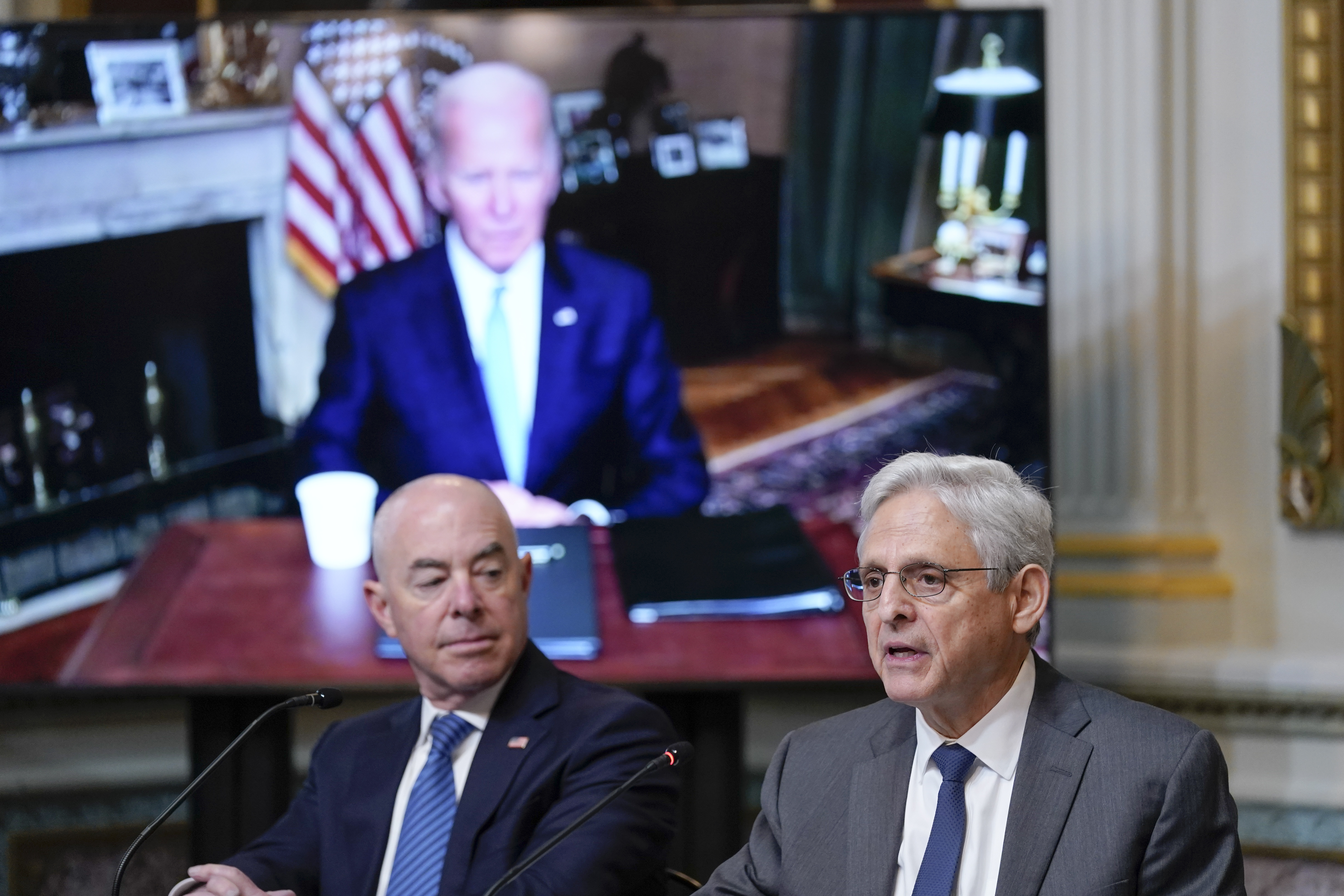 Attorney General Merrick Garland, right, speaks during the first meeting of the interagency Task Force on Reproductive Healthcare Access in the Indian Treaty Room in the Eisenhower Executive Office Building on the White House Campus in Washington, Wednesday, Aug. 3, 2022. Homeland Security Secretary Alejandro Mayorkas, left, and President Joe Biden, on screen, listen. (AP Photo/Susan Walsh)
Attorney General Merrick Garland, right, speaks during the first meeting of the interagency Task Force on Reproductive Healthcare Access in the Indian Treaty Room in the Eisenhower Executive Office Building on the White House Campus in Washington, Wednesday, Aug. 3, 2022. Homeland Security Secretary Alejandro Mayorkas, left, and President Joe Biden, on screen, listen. (AP Photo/Susan Walsh)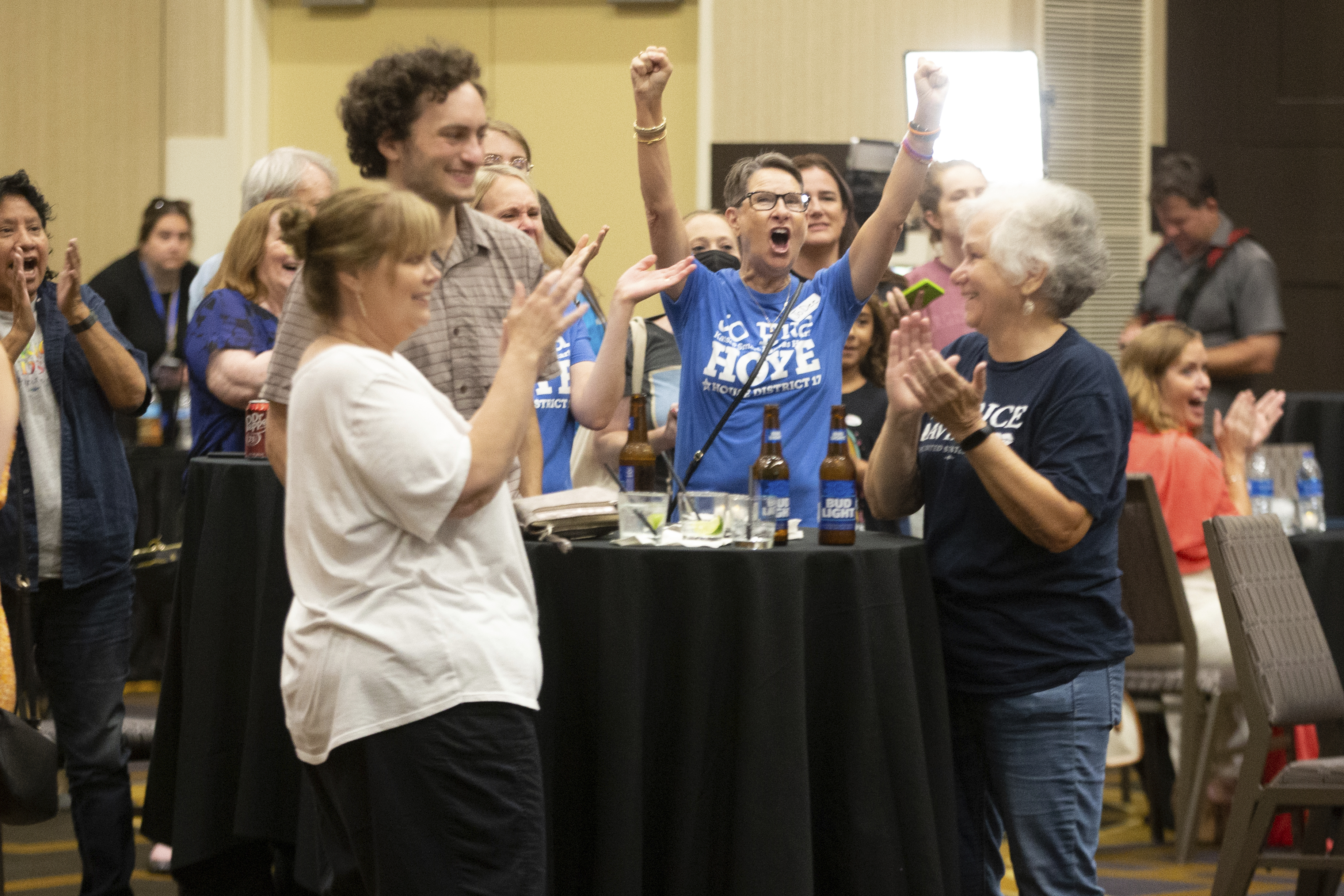 Abortion-rights supporters rejoice as early polls indicate the proposed constitutional amendment in Kansas has not passed late Tuesday, Aug. 2, 2022, at a Kansans for Constitutional Freedom election watch party at the Overland Park Convention Center in Overland Park, Kan. (Evert Nelson/The Topeka Capital-Journal via AP)
Abortion-rights supporters rejoice as early polls indicate the proposed constitutional amendment in Kansas has not passed late Tuesday, Aug. 2, 2022, at a Kansans for Constitutional Freedom election watch party at the Overland Park Convention Center in Overland Park, Kan. (Evert Nelson/The Topeka Capital-Journal via AP)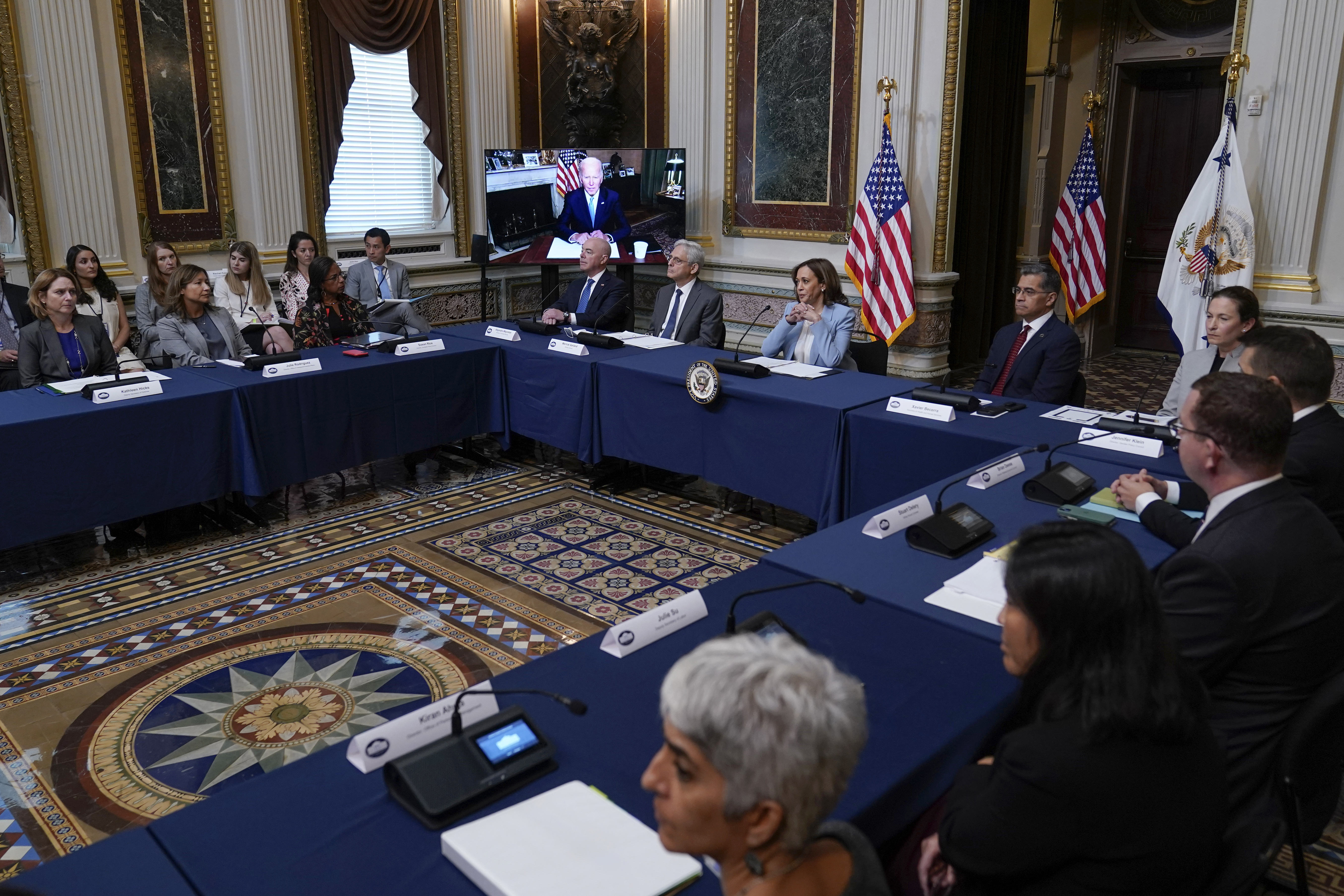 President Joe Biden speaks virtually from the Indian Treaty Room on the White House complex in Washington, Wednesday, Aug. 3, 2022, on securing access to reproductive and other health during the first meeting of the interagency Task Force on Reproductive Healthcare Access. Vice President Kamala Harris, third from right, and other administration officials listen. (AP Photo/Susan Walsh)
President Joe Biden speaks virtually from the Indian Treaty Room on the White House complex in Washington, Wednesday, Aug. 3, 2022, on securing access to reproductive and other health during the first meeting of the interagency Task Force on Reproductive Healthcare Access. Vice President Kamala Harris, third from right, and other administration officials listen. (AP Photo/Susan Walsh)